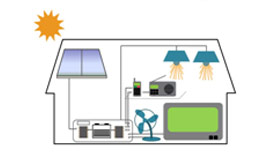Lighting Africa: Moving Consumers Up the Energy Ladder
 After successfully catalyzing the market for clean, affordable solar lighting products in the un-electrified areas of Africa and enabling more than 28 million people access to clean, affordable lighting, the IFC-World Bank Lighting Africa program is now extending support to products that offer a wider range of energy services, that go beyond lighting and cellphone charging.
After successfully catalyzing the market for clean, affordable solar lighting products in the un-electrified areas of Africa and enabling more than 28 million people access to clean, affordable lighting, the IFC-World Bank Lighting Africa program is now extending support to products that offer a wider range of energy services, that go beyond lighting and cellphone charging.
This expansion into larger solar home kits is prompted by consumer and industry demands, as well as rapid development of new technology, and the emergence of new business models that are availing a wider range of modern energy services to people without access to grid electricity.
“We would now like to get more powerful solar products that can run computers or TVs so that we can watch the World Cup or wrestling,” one parent at a school on the outskirts of Dakar, Senegal told a team from the Lighting Africa program earlier this year.
Lighting Africa will now support solar home system (SHS) kits, which typically include a solar module (panel), a power control unit, a power storage unit (battery), and multiple lights. These products can run radios, fans, computers and TVs, and therefore use more energy – from 10W up to 100W power.
Already manufacturers are developing a new generation of super-efficient solar powered appliances to better meet consumers’ household and small business energy needs. At the same time, a number of solar energy companies are using mobile pay-as-you-go (PAYG) systems to reduce barriers to uptake, allowing low-income African consumers access to this life-altering technology.
Since its inception in 2007, the Lighting Africa program has supported the development and marketing of high quality, affordable lighting products to low-income households that rely on unsafe, expensive lighting fuels such as kerosene.
The solar lighting products supported thus far, have included portable lanterns, task lights and single room lights, some of which can charge cellphones and radio batteries. These typically run on less than 10 watts power.
These solar lights are transforming lives in rural areas, particularly by improving study conditions for children and unleashing the entrepreneurial spirit and aspirations of rural communities. These solar lighting devices provide the first step in accessing modern energy, and are widely regarded as being potentially as transformative as the cell phone.
Through its sister program Lighting Global, Lighting Africa is currently working with industry to develop quality standards for SHS kits, and will begin testing the SHS kits this year.
“We’re excited to be scaling up the size of technology supported by the Lighting Africa program,” says Dan Murphy, the World Bank Lighting Africa Program Manager. “These transformational products will enable African households to move up the energy access ladder thanks to the greater level of energy services these systems can deliver.”
Moving up the energy ladder into larger systems will expand off-grid communities’ access to modern energy, contributing to the achievement of the Sustainable Energy for All (SE4All) goal by 2030.

